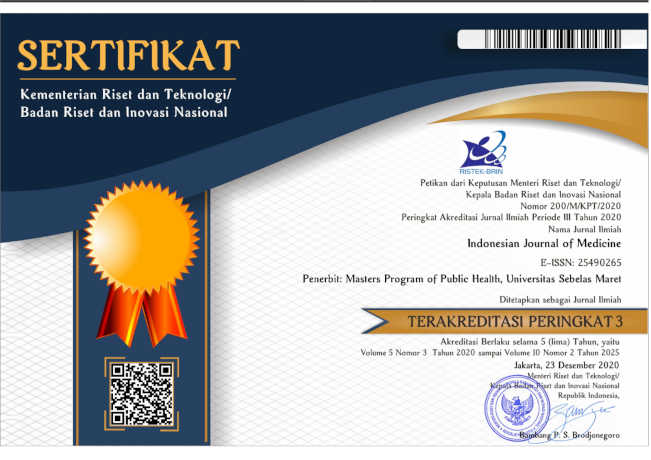Women Empowerment in Health: Systematic Review
DOI:
https://doi.org/10.26911/theijmed.2023.8.2.630Abstract
Background: Women's Empowerment is an integral part of human rights and development because the value system leads to the development of a good family, community, and country. Empowerment of women can have important implications for health in the form of education, access, and change in terms of services and family welfare. This systematic review aims to determine the influence and model of empowerment of women in the health sector.
Subjects and Method: This systematic review begins with searching data using 5 databases with keywords women’s empowerment, women’s health, and empowerment model. Researchers used five databases, PubMed, Scopus, Science Direct, Springer Link, and BMC with a range of 2017-2022. Articles were searched using keywords that had been determined by the researcher then the articles were extracted based on criteria inclusion and exclusion using the PRISMA protocol. Thus, 11 articles were found that matched the criteria of JBI's critical assessment tool for analysis.
Results: A total of 11 studies were included in the analysis originating from several countries such as Iran, Australia, and the Netherlands. Empowerment of women is a multilevel construction that refers to individuals, organizations, and society. Women's empowerment needs to involve mutual respect, critical reflection, caring and group participation, where people gain greater access to and control over their resources.
Conclusion: Factors that influence women's empowerment are age, education, occupation, religion, marital status, socio-economic, demographics, different behavior, special characteristics of society, household harmony, place of residence, mobility, decision-making, social life, media exposure, information technology, socio-culture and access to health services. The women's empowerment model that has been developed refers to 3 domains: micro, meso, and social capital levels; as well as macro level.
Keywords: empowerment, women, model, health
Correspondence: Rumpiati. Institute of Health Science STRADA Indonesia Jl. Sumberece 37 Tosaren Pesantren Kota Kediri. Email: rumpiati75@gmail.com. Mobile: +62812-3007-1403.
Indonesian Journal of Medicine (2023), 08(02): 194-203
https://doi.org/10.26911/theijmed.2023.08.02.09
References
Abbas S, Isaac N, Zia M, Zakar R, Fischer F (2021). Determinants of women’s empowerment in Pakistan: evidence from Demographic and Health Surveys, 2012–2013 and 2017–2018. 21(1): 114.
Ahmed M, Moorthy R (2021). Gender inequality in Assam: factors affecting women’s political participation in electoral politics. Ling Rev. 5(S2): 922933.
Ambler K, Jones KM, O'Sullivan M (2021). Increasing women's empowerment: implications for family welfare: iza discussion papers.
AmiriFarahani L, Parvizy S, Mohammadi E, AsadiLari M, Taghizadeh Z, Pezaro S (2021). Development, implementation, and evaluation of the ‘BELIEVE’ program for improving physical activity among women: a mixed method action research study. BMC Sports Science, Med Rehabil. 13(1): 135. Doi: 10.1186/s13102021003670.
Ansong JK, Otupiri E, Apenkwa J, Aboagye PK (2019). Women’s empowerment and contraceptive use: a community-based survey in periurban Kumasi. Ghana. 3(1512): 1512.
Batool SA, Ahmed HK, Qureshi SN (2016). Economic and psychosocial determinants of psychological empowerment in women. J Soc Psych. 14(1): 21.
Batool SA, Batool SS (2018). Role of contextual factors in women’s empowerment. J Art Sciens. 1(5).
Bayeh E (2016). The role of empowering women and achieving gender equality to the sustainable development of Ethiopia. Sciens Rev B. 2(1): 3742. Doi: 10.1016/j.psrb.2016.09.013.
Castro Lopes S, Constant D, Fraga S, Bique Osman N, Correia D, Harries J (2021). Socioeconomic, demographic, and behavioral determinants of women’s empowerment in Mozambique. PloS one. 16(5): e0252294.
Gupta CD (2018). The psychological aspects of women’s empowerment in the workplace. Int J Curr Res Modern Educ. 3: 375378.
Heera K, Shrestha M, Pokharel N, Niraula SR, Pyakurel P, Parajuli SB (2021). Women’s empowerment for abortion and family planning decision making among marginalized women in Nepal: a mixed method study. J Repro He. 18(1): 28. Doi: 10.1186/s1297802101087x.
Huis MA, Hansen N, Otten S, Lensink R (2017). A three-dimensional model of women’s empowerment: Implications in the field of microfinance and future directions. Front psych. 8: 1678.
Ikhar MR, Banerjee S, Bandyopadhyay K, Tiwari MK, Deshmukh P (2022). Are women with more of ‘social capital more empowered? A cross-sectional analysis from rural Wardha, Central India. J Family Med Care. 11(2): 472.
Khatiwada J, Muzembo BA, Wada K, keda S (2020). Dimensions of women’s empowerment on access to skilled delivery services in Nepal. BMC preg child. 20(1): 113.
Kiani Z, Simbar M, Dolatian M, Zayeri F (2020). Structural equation modeling of psychosocial determinants of health for the empowerment of Iranian women in reproductive decision making. 20(1): 19.
León FR, Lundgren R, Sinai I, Sinha R, Jennings V (2014). Increasing literate and illiterate women’s met need for contraception via empowerment: a quasi-experiment in rural India. 11(1): 110.
Manuere F, Phiri N (2018). A literature review of women empowerment and development in Zimbabwe: a look at new insights and perspectives. J Pub Admn. 8(4): 5765.
Moubarak HFA, Afthanorhan A, Alrasheedi ESN (2021). Multicultural Psychological empowerment scale for Saudi Women. Front psych. 12.
Nwogwugwu N (2019). Women’s empowerment and women’s health in Africa. In O. YacobHaliso & T. Falola (Eds.). The Palgrave Handbook of African Women's Studies. 119. Cham: Springer International Publishing.
Page MJ, McKenzie JE, Bossuyt PM, Boutron I, Hoffmann TC, Mulrow CD, Brennan SE (2021). The PRISMA 2020 statement: an updated guideline for reporting systematic reviews. 10(1): 111.
Phukan R (2021). Empowering family with empowering women in empowering assam: A case study of orunodoi scheme in baksa district. Ling Rev. 5(S1): 15541568.
Rinartha K, Suryasa W, Kartika LGS (2018). Comparative analysis of string similarity on dynamic query suggestions. Paper presented at the 2018 Electrical Power, Electronics, Communications, Controls and Informatics Seminar (EECCIS).
Samanta T (2020). Women’s empowerment as self-compassion?: Empirical observations from India. PloS one. 15(5): e0232526.











